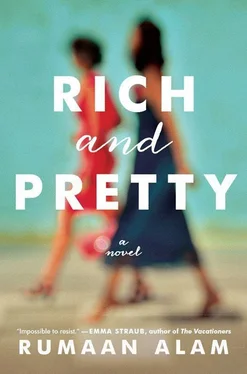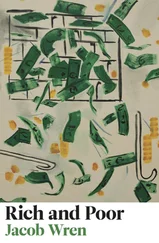Rumaan Alam
Rich and Pretty
for David, for Simon, for Xavier
Sarah talks too loud. It’s a problem.
Usually, Lauren tries to correct for the pitch of Sarah’s voice by whispering. It never works. This has been going on for years.
“I mean, when is the last time I even saw you?” Sarah gestures around the restaurant, wineglass in hand like a scepter in a queen’s. The Gewürztraminer sloshes close to the rim of the paper-thin glass but doesn’t spill.
“I saw you. .” Lauren can’t remember. Two weeks, maybe three? Maybe twenty days. Possibly a month. A month doesn’t seem so long. A lot happens in a month. They’re busy, they’re adults, it is what it is. She shrugs.
“Anyway.” Sarah puts the glass down. She leans forward across the table, like they’re about to start conspiring. “How are you?” She reaches a hand out, as though to take Lauren’s.
Lauren pulls her hand back, a reflex. She sips her own drink, vodka, soda. The ice tinkles prettily: There’s no more inviting sound to her, it’s sophistication, like a British accent or that call-and-response of high-heeled shoes on tile. “I’m fine.”
What sort of question is this, and is it even truly a question? She’s the same. They’re both the same.
“How are you?” There’s no other way to answer the question than by asking it back. This is the point. It’s catechism, not conversation.
Sarah clears her throat. There’s a smile at the corner of her mouth, but there almost always is; she’s almost always happy, she has very little reason not to be. She’s charmed, her life is charmed. “Well,” she says.
Of course, there’s a reason they’re here, this unremarkable bistro, poor lighting, potted plants, chalkboard menus. Sarah has news, and news is something she believes should be delivered in person. She should have gone into a field where you’re often charged with having life-altering conversations: oncology, the Nobel Prize committee. As it is, she has no field in particular, and her news is rarely life altering, to anyone but herself. They are best friends.
The thing that’s galling, or irritating, or whatever the word is, is that though it’s Sarah who always wants to make plans, Sarah is always so, so busy. She’s at the store twice a week, sometimes more often, it’s a shifting schedule. She has a standing dinner engagement with her parents, Sunday nights: the three of them, cozy in their big house, roast chicken off those handmade ceramic plates her mom bought in Sausalito forty years ago. Always a roast chicken; potatoes, soaked for hours so they bake up crispy, with rosemary; chardonnay from old jam jars. Sometimes a fourth guest, one of her dad’s acolytes, or one of Sarah’s friends. Lauren has been that fourth, many times, and now, presumably, there’s Dan, too, placid, efficient Dan. She can picture the orange and yellow plates perfectly. Other nights, it’s a movie with this friend, the theater with that friend, this person is reading at that bookstore downtown, this person is giving a lecture, there’s that dance performance at the theater space on whose board Sarah’s mother has sat for decades, or she’s with Dan, reliable Dan whose face Lauren can barely stand, but whatever, they’re in love. Yet it’s Sarah who calls, Sarah who sends text messages and e-mails, Hey, I never see you, where are you, why can’t I see you, how about a week from next Wednesday? Lauren puts it off, and puts it off. She likes the frisson of improvisation. Fun cannot be scheduled. Fun simply occurs.
“This is fun,” Lauren says, for no reason.
“I’m getting married,” Sarah says.
She holds up her hand, but there’s no ring on it. Lauren would have noticed. She’s a thirty-two-year-old woman. She sees every ring, whether she wants to or not.
Sarah waves her hand about again. “The ring is being sized. It was his grandmother’s. I don’t know why I’m holding my hand up like this.”
“You’re getting married!” Lauren lifts her glass in salute. She’s probably supposed to scream. To feel tears stinging the corners of her eyes. Unsure what to do next, she grins like a maniac.
“I’m getting married!” Sarah, louder even than before, but no one cares; even bystanders are excited about marriage.
“To Dan?”
Sarah looks at her. Her smile doesn’t fade, exactly. It doesn’t diminish, not really. But something else slips into it, or over it. It changes somehow. “Yes,” she says. “Of course.”
“Of course!” Lauren yells.
Huck and Lulu throw parties.It’s their thing. The second act of their American lives. Huck does other things, too: teaches those sought-after seminars colleges trumpet in their promotional materials, gives talks at the Council on Foreign Relations, takes the shuttle to D.C. to meet think-tank people to do think-tank things, writes querulous letters to the editors of policy journals, shuffles to his office on the fourth floor of the house to produce op-eds or the introductions to books his friends and students have written. Henry “Huck” Thomas (CNN’s chyron usually includes the quotation marks; the nickname’s origins are forgotten): not a maker of history, but present at its conception. Confidant to presidents (some of them, anyway), an ambassador to the world on behalf of what he’s always believed to be its greatest nation. Huck is hardworking, sure, but it’s possible to view his rise as evidence of something else — luck; right time, right place; the indomitable spirit of a certain kind of white man. Arriving at the State Department just as one presidency was collapsing, then proving himself invaluable as the subsequent officeholder tried to find his feet. That brief American presidency had birthed Huck’s long and successful career. He knew enough about the game to get his wife’s assets out of Venezuela by 1979, and, from there, into all the right places. They’ve been millionaires for at least that long. That is his specialty: being a step ahead of things.
Huck’s office has dormer windows from which you can see the backs of all the houses on the next block over. Lauren and Sarah used to smoke cigarettes in there, fanning the smoke out of the open window, even though no one would have smelled it because at the time Huck himself went through half a pack a day, the Kents burning away to nothing in the ashtray as he typed furiously about what Johnson got wrong in Vietnam or the welfare state’s inherent evils. They were idiots as teenagers.
Lulu is retired. Her one album — a couple of traditional corridos, a Chilean tune closely associated with Joan Baez, a few folky pop songs — remains a cult favorite, had a bit of a renaissance when one of her originals was used over the opening titles of what turned out to be a blockbuster holiday film. Royalties: one way the rich get richer. The voice is not entirely gone, though it’s changed, deepened, grown slack, as female voices do with age. She’d never seriously made a go of it, had ended up married while only twenty-four, which was how it was done at the time. She’d followed the rest of the script: decamping to New Haven and making lunches and dinners for Huck, as though he were her child, tagging along to Washington and dressing to impress for various, boring parties, giving birth, going out to dinner, decorating the Connecticut house, hosting fund-raisers for this and that. It’s time-consuming, being a part of this family. Lauren never knew three busier people. It’s remarkable that none of them actually have jobs.
They’re throwing a party tonight. Something to do with a book, maybe, she can’t remember, but Sarah has insisted that she come, has reminded her about it with weekly e-mails for two months now, as well as helpful voice-mail messages:
Читать дальше












